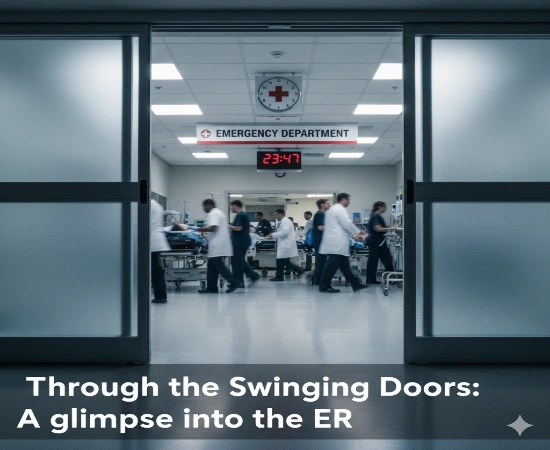Through the Swinging Doors: A glimpse into the ER
Ever wondered what happens the moment you step into an Emergency Room (ER)? When your life hangs in the balance, it is the ER that transforms chaos into calm. Yes, emergencies strike without warning, and time is critical. Let’s take a closer look at how patient emergency care unfolds.
Why First Aid and Emergency Care Matter?
A sudden accident, severe pain, or a life-threatening situation is an emergency. When it strikes, the first place people rush to is the Emergency Room (ER). Inside an emergency room, it is equipped with state-of-the-art facilities to save lives. It's important to understand that the ER's primary mission is not to provide a complete diagnosis or cure for you. It is to stabilize you, rule out or treat immediate, life-threatening conditions, and determine whether hospital admission is necessary.
The 7 important steps: What is included in the emergency room?
An emergency room is all about urgency, skilled professionals, and rapid decision-making. Let's check on emergency patient care.
1. Arrival and Triage
The moment you arrive at the ER, your life-saving process begins with emergency room triaging. A triage nurse quickly assesses your vital signs, like heart rate, blood pressure, and oxygen levels, and symptoms.
- Critical cases such as heart attacks, strokes, or major injuries are treated immediately.
- Moderate cases may require quick evaluation but can wait briefly.
- Minor injuries or illnesses might be attended to after more urgent patients.
Emergency care nursing ensures that every patient gets care according to the urgency of their situation, not necessarily in order of arrival.
2. Registration and Basic Details
After triage, you'll move to registration. The hospital staff records your personal and medical information so the care team has access to your history, allergies, medications, and insurance details. It is critical for safe and efficient treatment.
3. Evaluation by the ER Team
You will be taken to an examination area or treatment bay. A nurse checks your vitals. An emergency physician evaluates your symptoms in detail. He will enquire about your condition, review your medical history, and perform a physical examination to determine the cause of your problem.
4. Diagnostic Tests and Monitoring
If your condition requires further investigation, diagnostic tests are ordered. It includes:
- Blood tests to check infection, sugar, or electrolyte levels.
- X-rays or CT scans to identify fractures or internal injuries.
- ECG (Electrocardiogram) to assess heart rhythm.
- Ultrasound for internal organ assessment.
- While awaiting results, patients are closely monitored for any changes in their condition.
5. Treatment and Stabilization
Based on the test results, the ER team begins treatment. This could involve:
- Administering IV fluids or medications.
- Managing pain or fever.
- Performing minor procedures such as sutures or wound dressing.
- Stabilizing life-threatening conditions before further treatment.
6. Observation or Admission
After treatment, the doctor decides the next steps.
- If your condition improves, you may be discharged with prescriptions and follow-up instructions.
- If your condition needs further care or monitoring, you'll be admitted to the hospital or transferred to the ICU (Intensive Care Unit).
7. Discharge and Follow-Up
Before leaving, the nurse provides instructions on medication, rest, and when to return if symptoms worsen. This ensures continuity of care even after you leave the ER.
24/7 Expert Emergency Medical Care at Believers Hospital, Thiruvalla
Believers Hospital, Thiruvalla, offers quality care and efficient service with modern emergency medicine equipment and state-of-the-art bedside monitoring. Our Department of Emergency Medicine has a team of dedicated, highly skilled emergency physicians, paramedics, and ER nurses trained in medical, surgical, cardiac, polytrauma, pediatric, and other acute conditions.
At Believers Church Medical College Hospital, Thiruvalla, we offer compassionate care to our patients. Our Emergency Department has 35 beds, including triage beds, observation areas, and a multi-bed resuscitation bay, and handles around 30,000 patients annually.
We have mobile ICUs that have both advanced cardiac life support and basic life support. It has trained emergency doctors and paramedics who provide vital pre-hospital care while transporting critically ill or injured patients. Our emergency department operates with precision, teamwork, and compassion. We save lives and provide critical support when it matters most. ? ?
